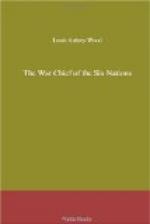The hunting excursion to the Ohio came at length to an end, and then the Mohawks started for their lodges in the far north-east. Up the broad river sped the strongest canoe-men of all the peoples of the forest, with Thayendanegea stowed snugly in the bottom of some slender craft. Over the long and weary portages trudged his mother, her child bound loosely on her shoulders. Their route lay towards Lake Erie, then along the well-trodden trail to the Mohawk river; and the baby was for the first time among the fertile cornfields and the strange Long Houses of his people. At this period the Mohawks lived farthest east of all the tribes of the Six Nations. Their main settlements were along the Mohawk river in what is now the state of New York, but they claimed authority over the region stretching thence towards Montreal. They had three settlements on the Mohawk, the central one of which, called Canajoharie Castle, was the home of Thayendanegea’s parents. Near by lived the celebrated William Johnson, His Majesty’s representative for Indian Affairs in the colony of New York, who some years later became sole superintendent of ’the six united nations, their allies and dependents.’
When Thayendanegea grew stronger he began to romp with the other boys of the village. With them he followed the women down to the river’s brink, picking up shiny pebbles from the sand, or watching the minnows dart about in the sunlight. With them, when the days were long, he crawled through the brambles, looking for luscious berries, or ran with the wiry Indian dogs into copse and brushwood. Then he learned to swim, to fish, and to dip his paddle noiselessly in the stream. Like every red child, Thayendanegea listened rapt in wonder to the tales that were told him. The Mohawks had a storehouse of fable, and he soon became versed in the lore of the forest. Perhaps, too, he sat beside his wrinkled grandfather, who was a sachem, [Footnote: That Thayendanegea was the grandchild of one of these sachems who were so honoured appears from information given in an article published in the London Magazine; of July 1776. The material for this account of him is supposed to have been supplied by the famous author James Boswell, with whom, while on a visit to England




